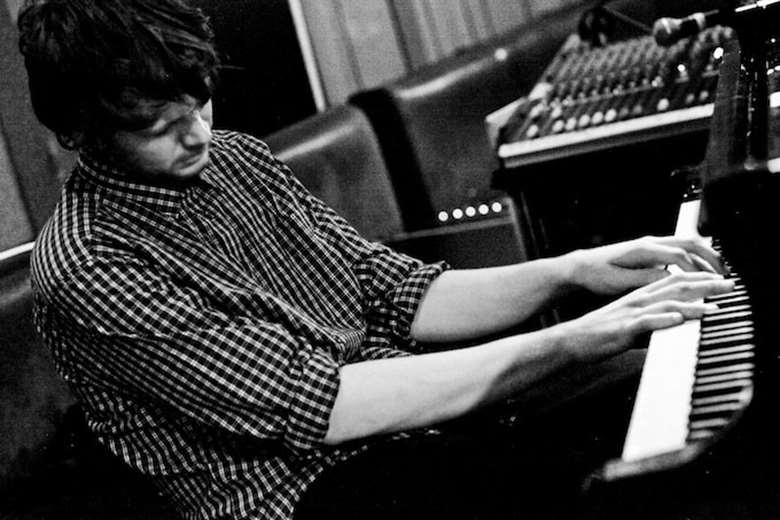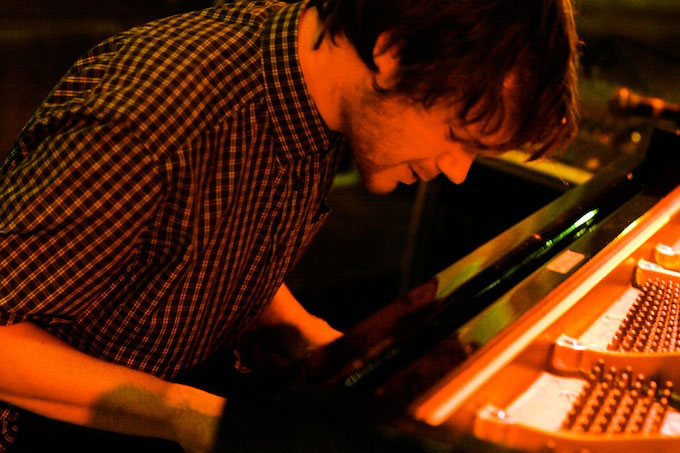Interview: Dominic J Marshall on studying jazz at university
Wednesday, November 2, 2016
Rising star pianist Dominic J Marshall has produced four impressive albums to date, his latest being The Triolithic, featuring his molten blend of hard hitting melodic jazz underpinned with slugged hip hop grooves and daring dynamics.

He’s also keyboardist with internally acclaimed trip hop pioneers Cinematic Orchestra, and is currently on a world tour with them, while he also moonlights as an electronica artist under the moniker DJM. Born in Scotland, Marshall moved to England when he was three years old, with music running in his family: his father an Oxford graduate, classical piano player and teacher and his mother a self-taught pianist. Attending both Leeds College of Music and Conservatorium van Amsterdam, where he studied jazz piano and obtained Bachelors and Masters diplomas respectively, before turning professional. Fellow Leeds and University of Amsterdam alumnus, musicologist Rokas Kucinskas, interviewed Dominic this summer in Amsterdam about his life in music so far...
Before attending higher music education, what were your piano studies like?
My father was my first piano teacher, introducing me to the instrument and giving me lessons. At the beginning they were mainly classical music focused, but with time my father also introduced me to improvisation and composition via scales, and how rearranging notes in them affects the music I was playing. It also was something that I really liked, being a bit of an opposite direction to what my main focus at the time was – classical music. I did develop an appreciation for playing, and it became a daily habit that after school I would come home and play for two hours. Just improvise and what not. I had a few lessons with jazz pianists before my auditions, as people told me I should consult with people who know about jazz more than my father, but he was my only true teacher until I enrolled in Leeds College of Music.
So you were not really playing jazz until you enrolled in LCM?
I was, but it was quite a low standard playing. I mean we had gigs and all. There was one in a pub, across from my house just before I left for Leeds, where together with my friend I was trying to play “Giant Steps” (by John Coltrane), but had to stop after 20 bars. We just couldn’t follow the form [laughs]. The thing is, that I never learned the simple stuff, like say “Satin Doll”. I wanted to play things like “Giant Steps”. The first jazz tunes I learned were “Turn Out the Stars”, “Time Remembered”, “Waltz for Debby”.
You started playing Bill Evans’ compositions straight away?
Yes [laughs]. I had books with his transcriptions, and I read some of his pieces.
How did your study habits change in LCM then?
I spent a lot of time practicing. Especially from the second year onwards. I realized that I didn’t have dexterity in my fingers. The speed in my hands was nowhere near the speed I wanted to have. It sort of developed into an inferiority complex, and I became anxious that other students had something I didn’t. All the first year I overlooked it by not being strict with myself, so during my second year I started practicing seven hours a day. Scales, arpeggios, J. S. Bach, transcribing other pianists’ solos, learning new songs – all became a daily routine for me.
Working with a metronome?
I’m doing that now [laughs]. It’s funny, because during one of the workshops [bassist and educator] Jeff Berlin came to LCM and told everybody not to practice with a metronome. He was very confident about it, and it did affect many of us, students. Suddenly we all were like “wow, he must be right”. Looking back, I appreciate what he said. Time comes from inside not from a machine; rhythm is not mechanical. But today, musicians work in highly technological environments, recording studios, and so forth. One needs to be aware of that, and the metronome becomes very important tool, especially if you consider something like BPM – an essential aspect in today’s music world.
Did you escape from that inferiority complex regarding the speed of your playing?
Well, it became one of the many things I want to have in my playing. But that’s the thing, you can never have anything in music – it just doesn’t belong to you. Now we’re sitting here, talking, and where is the music? Nowhere. If I sit down and start playing after a few beers, my hands will act very differently to what I am used to, and the whole speed element becomes something you shouldn’t solely focus on, because same beers might enhance my creativity, but the speed might suffer.
That’s an interesting way of looking at it. When did you start thinking about the matter in this way?
Just a little before I graduated from my Masters. I stopped being strict on myself in general, because the goal where you want to be, which is essentially why one practices, is always moving. It’s a moving target, and it can become a trap, if you do not have it set. You should practice for something, and if you do that for 5 years, there needs to come a time when you stop, look back, and say: “Did I achieve what I wanted? Because if I did, then I don’t need to practice it anymore”.
But when do you know that you have achieved your goal?
It’s funny, because I’m reminded of another workshop I went to LCM, when one of the fellow students asked a person, I can’t remember his name, leading the workshop: “How do you know when you have to stop practicing something?” And the person gave such a great answer: “How do you know when you fall in love?” It’s a feeling – you just know.

Going back to the beginning of the topic, Leeds, how would you describe your three years spent in there? How would you describe the institution itself?
Just a lot of work. A lot of time spent in classrooms; some great teachers. Mark Donlon, my principal teacher during my last year, for example, suggested me that I could do the Masters. Jamil Sheriff was also great. He was strict, but great because of that. I learned a lot from Mulele Matondo, too. Just by playing with him I learned a lot about rhythm and melody. These people make the institutions, and because of this institutions are always changing. I mean it was great back when I studied there. There were some lectures I didn’t attend, especially during my second year, but I was constantly working. I sort of made selective sacrifices for my individual practicing. Also, I learned as much from different musicians in LCM as I did from the teachers; made some good friends. In the end, I got a lot from it.
Do you miss it?
Do I miss it? Well, I never really missed schools. You take what you can from them and you move on. It’s like attending swimming lessons – once you know how to swim, you don’t think: “Oh, I want to go back to swimming lessons” [laughs]. That’s the thing with institutions that I said before – they’re always changing. I went and did a workshop there after I graduated, and it already felt like a different place. Some people were still there, but it did feel like a different place from what I remember. I do miss playing basketball though [smiles].
Ok, let’s talk about your Masters programme. Did you enroll in Conservatorium van Amsterdam straight after Leeds?
Yes, straight away. As I said, Mark Donlon gave me the idea to do the Masters programme. Perhaps he saw me practicing a lot and thought it could be something for me. I applied for a few programmes, and was accepted in Amsterdam. It wasn’t my first choice, but it turned out to be the best one for me. For my auditions I played Bill Evans’ and Robert Glasper’s tunes. As it turned out, piano teachers in Amsterdam are fond of Bill Evans, and maybe because of that I was given the place in the programme [smiles].
So you didn’t play some well-known jazz standard? Was it always like that for you?
Absolutely. I need to like the tune to perform it well, and if I played something like “Autumn Leaves” for my audition in Amsterdam, I don’t think I would have gotten in [laughs]. Even in Leeds with all the mandatory repertoire of jazz standards, I didn’t play many of them. I remember completely rearranging “All The Things You Are” because I didn’t like it, and I must admit, I’m still very much like that today. It’s all about the composition for me, and not so much about improvisation – I care about the framework in which I improvise. I met a lot of people during my time in both Leeds and Amsterdam, who complained to me how boxed-in they feel having to play all those jazz standards, but somehow I always managed to avoid this.
Are there big differences between BA and MA courses?
I think that both of them are similar, except that the MA programme is like a bigger pool to swim in, with more challenges. Most of my time spent in Amsterdam, however, I was doing the same things as in Leeds. I was behind the piano practicing, playing with people, learning from my fellow students, and some very good teachers. I could have socialized more than I did. I could have benefited from that. There’s definitely more freedom in the Masters. Teachers expect you to know what you want, and how to go there. For me that was perfect, because I knew where to go to in terms of my goals. Where the BA programme was more like: “You don’t know what you’re doing, so just come this way” [laughs].
Did you meet people in Amsterdam who were doing BA programme in jazz?
Of course.
Have you ever looked at them and compared them to yourself when you were studying in LCM? Maybe you thought about differences between the two institutions you studied in?
To be honest, I think that both LCM and CvA are very similar. They both are very big schools, which offer places to a lot of people, more than some other schools. I really like such approach, because it’s more sociable and you meet more people; rather than feeling isolated, you feel being a part of something bigger. I can imagine that in some schools that admit less people, you might run into troubles if you don’t like playing with them. What if you don’t like a bass player, but there isn’t any other to play with? What happens if he can’t play a funk groove, and you love playing it?
I don’t think you’re allowed to play funk in such schools…
No, you’re not – it’s bad [laughs]. Perhaps the basic difference between Leeds and Amsterdam is how much more international Amsterdam is. I really liked it, and because of that, while doing my Masters, I played in Germany, Russia, and Latvia. If you live in Amsterdam then all of the big European capitals, where one can find gigs more easily, are reachable by trains in a matter of hours, which is so great. In Leeds, you have the whole UK, but it’s not the same. It isn’t necessarily bad, but it’s not the same. The problem I’m experiencing is that people don’t want to go and listen to jazz anymore. Hence, it doesn’t matter where you live – Leeds or Amsterdam – the audience for jazz is getting older and older. It’s sad, but to me it feels like jazz scene in the world is dying, and I don’t want to be tied up to it, that is to say jazz.